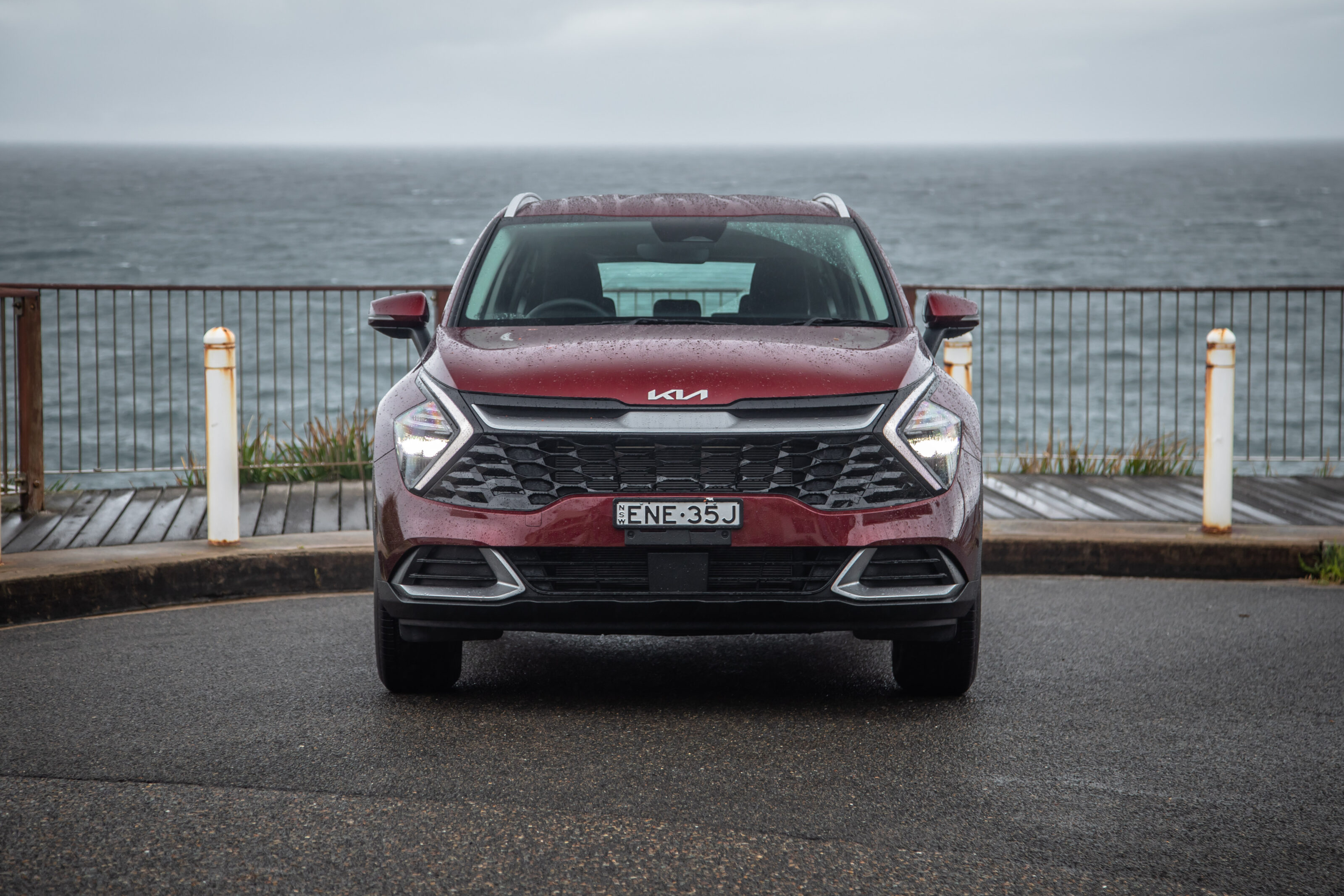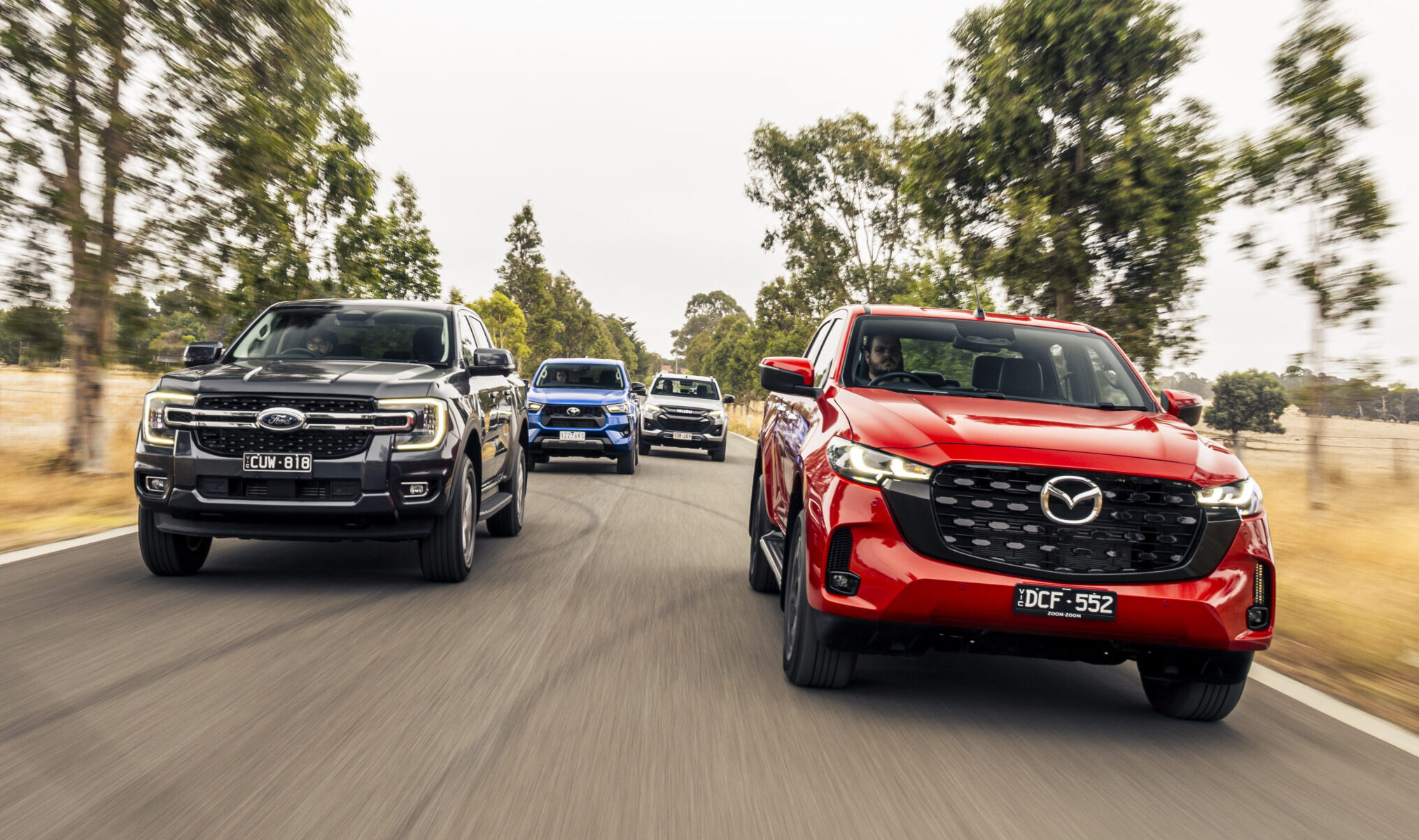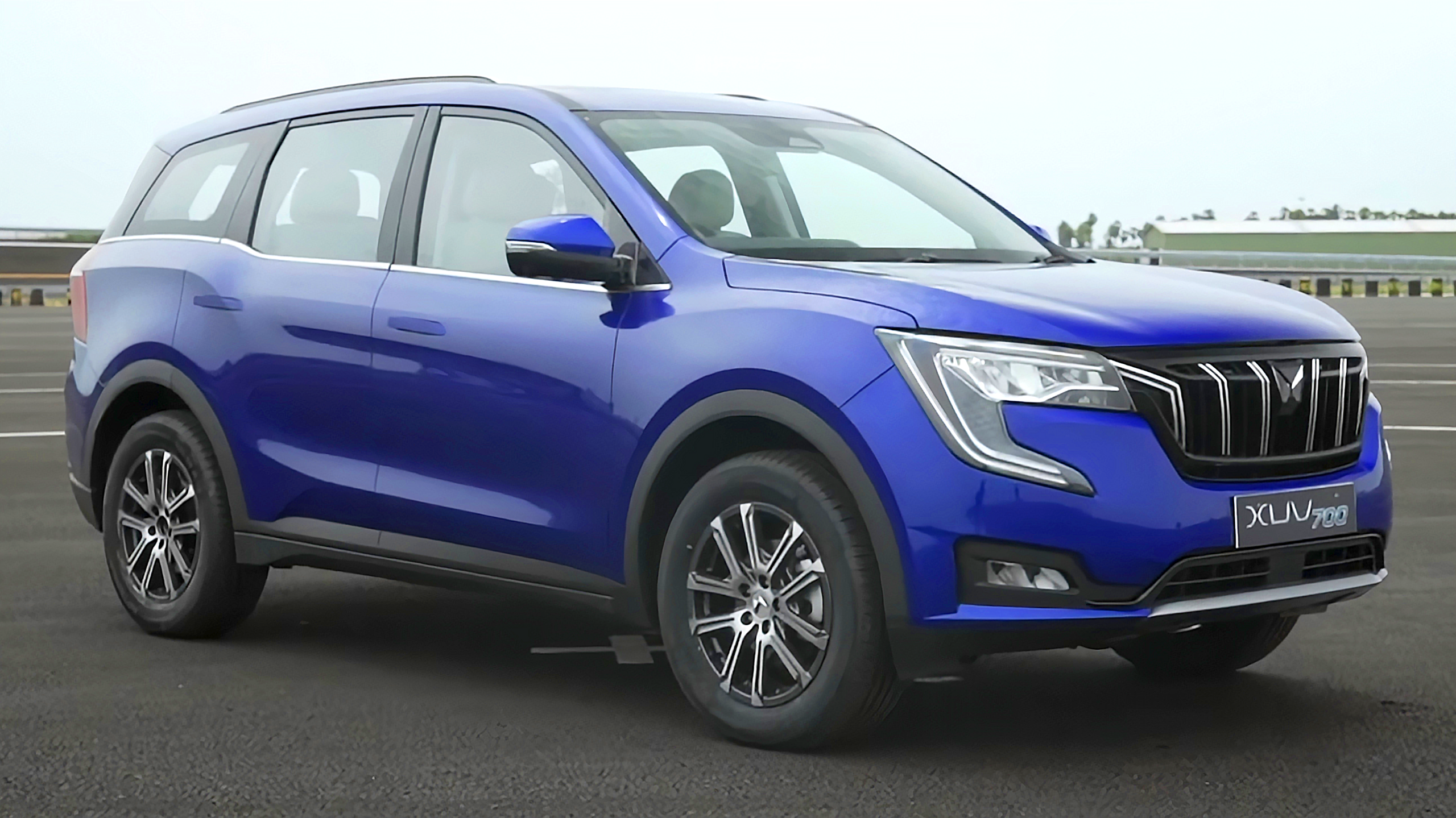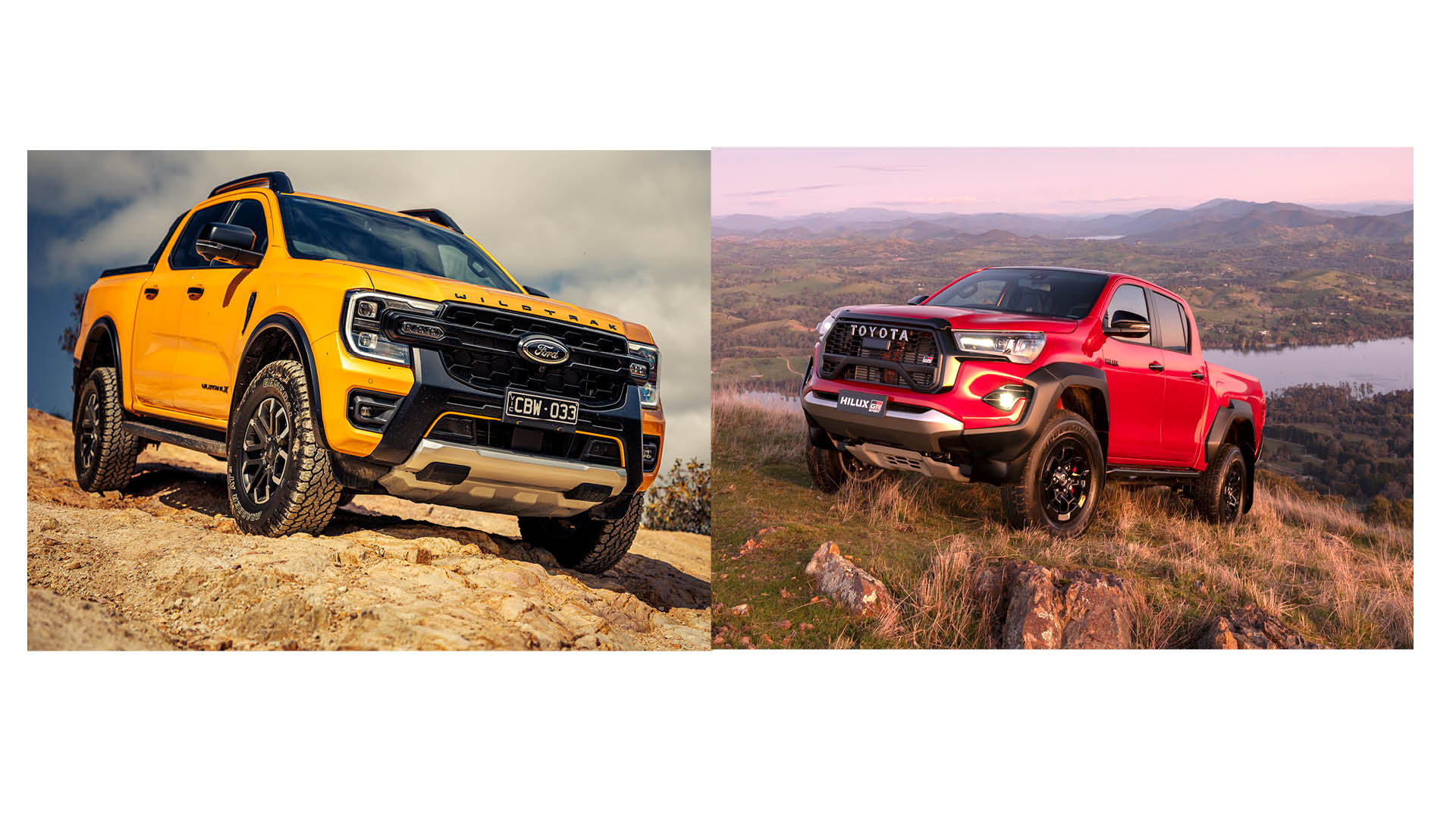Score breakdown
Things we like
- Excellent ride comfort
- Improved interior space
- All-round visibility
- Full-size spare wheel
Not so much
- Frustrating petrols and diesel premium
- Front-seat comfort not perfect
- No HUD. Wireless phone charging GT-Line only
- Hard plastics in base model
Staring at the 2022 Kia Sportage’s exaggerated styling – headlined by striking, boomerang-shaped LED daytime running lights – it’s most definitely an understatement to say Kia has come a long way as a brand since the original SUV debuted locally nearly 25 years ago.
Beyond an ever-increasing confidence in its approach to vehicle design, Kia’s Australian sales in 2021 have at times threatened to overtake those of affiliate Hyundai.
The fifth-generation version of its mid-sized SUV now gives it a completely fresh challenger to compete against the latest version of its Hyundai twin, the Tucson, released earlier in 2021.
Editor’s note: In this story, the GT-Line is the green car, and the S is the blue.

Hyundai’s Tucson is far from being the only key rival in a densely packed segment that includes sales giants such as the Mazda CX-5, Mitsubishi Outlander, Nissan X-Trail and Subaru Forester. The prime target, though, is the category’s runaway sales leader – the Toyota RAV4.
The Sportage is missing a key weapon for now, however, launching without the new hybrid variant that would directly challenge the RAV4’s dominant petrol-electric version.
Expect it sometime in 2022. In the meantime, the Kia now matches the Toyota for size – sharing the Tucson’s new platform to grow about 17cm in length to 4.66 metres. Width and height nudge up slightly and the wheelbase extends by 8.5cm over the old Sportage.

Pricing and features
Pricing has increased by up to $2410, with the entry-level Sportage S starting from $32,445 before on-roads, or $34,690 driveaway. The range spans $20,000, topped by a GT-Line diesel that nudges the RRP of a Sportage model past $50,000 for the first time.
Yet you’re not only getting a bigger SUV for your money. Every trim grade is loaded up with extra equipment over their predecessors.
Adaptive cruise control, blind-spot monitoring and rear cross-traffic alert, for example, are standard from the S upwards where previously exclusive to the GT-Line.
Unsurprisingly, the GT-Line cabin puts the Sportage’s best foot forward when trying to establish a more upmarket vibe.


The S also gains LED headlights and taillights, speed-limit notification and an 8.0-inch infotainment touchscreen, as well as the front centre airbag from the larger Sorento SUV that can protect the heads of front occupants in a side impact.
Opting for the SX bumps the infotainment display up to 12.3 inches and gains integrated navigation but swaps wireless Apple CarPlay and Android Auto for wired connection (a seemingly long story involving mapping complications). Other key additions are 18-inch alloy wheels, dual-zone climate control, and rain-sensing wipers.
SX+ buyers are treated to tempting niceties such as 19-inch wheels, electric driver’s seat, heated front seats, keyless entry, auto tailgate with proximity sensor, and a Harman Kardon audio system.

The all-you-can-eat-buffet GT-Line has a comprehensive list of features including a curved dash display that combines dual 12.3-inch infotainment and driver screens, full LED headlights, LED striped indicators, panoramic sunroof, surround-view camera, blind-spot video feed, wireless smartphone charging, ventilated front seats, and leather-appointed upholstery with seatbacks topped in fake suede.
Kia Australia is predicting the two petrol engine options to account for 80 per cent of sales, with the sole diesel taking about 20 per cent.
The diesel is available for all trim grades for a premium over either the 2.0L petrol or 1.6L turbo-petrol. The latter is available only on higher-spec models.
SX and SX+ variants are delayed until early 2022, so we are reviewing the models at opposing ends of the Sportage range.

Comfort and Space
Unsurprisingly, the GT-Line cabin puts the Sportage’s best foot forward when trying to establish a more upmarket vibe.
That curved dual digital display – spanning nearly 25 inches across the dash – lends a high-tech look, and the flagship’s centre console looks smarter by swapping the regular gear selector of other models for a shift-by-wire rotary dial.
Soft-touch materials are in all the regular touchpoint areas, and glossy black plastic is quite extensive (which is good or bad depending on your preference).

Kia still isn’t quite as good at disguising cheaper plastics as rival carmakers such as Mazda, Peugeot and Volkswagen, however, and there’s obvious cost-cutting where the rear door cards have been switched to hard plastic. Auto windows are limited to the front doors (or not at all in the case of the base model).
There’s still quite a gulf in the perception of quality between the GT-Line and base Sportage, where hard plastics seem universal.
Regardless of trim grade, you can have any interior colour you like. As long as it’s black. Kia Australia says it is looking to introduce alternative cabin hues.

The design and tactility of the GT-Line’s seats doesn’t make them feel anything special over the cloth seats in the S. In both cases, the cushion feels shorter than ideal and the electric or manual adjustment doesn’t allow the seats to go as lower as some occupants might like.
Kia’s Dual Control Panel, standard on all but the S, is clever. Press a button and the dials change from temperature adjusters to volume and radio-tuning controls, while touch buttons switch from functions such as fan speed and recirculation to shortcuts for the infotainment display.
The Dual Control Panel is clever. Press a button and the dials change from temperature to volume controls, while touch buttons switch from fan speed to shortcuts for the infotainment.

Front-cabin storage is average. The best feature is the centre console’s open area that has VW-style cupholder grips that pop out with the press of a button.
The door compartments and glovebox could be bigger, while the smartphone trays only feature wireless charging in the GT-Line (Hyundai replicates this disappointment with the Tucson).
No shocks that a longer Sportage, with a longer wheelbase, delivers more interior space. Welcome it is, too, because Kia’s SUV now lifts its rear-seat room and luggage capacity out of the ‘average’ zone and into the pointy end of the segment.

The back seat now offers a significant amount of knee room, as well as generous foot space and headroom (including in the sunroofed GT-Line). The bench’s cushioning is better than that of the front seats, with good under-thigh support.
A trio of adults could just about squeeze across if truly necessary. ISOFIX anchors are in the outboard positions for child seats.
All trim grades come with rear vents, a centre armrest with cup holders and USB-C ports in the sides of the front seatbacks. The rear door bins fit larger drinks bottles than their counterparts in the front.
SX+ and GT-Line models add bag hooks and coat hangers (which look like tablet holders) on the seatbacks.

These grades also provide an auto tailgate described as having ‘gesture’ operation but is more accurately a hands-free proximity set-up where you stand at the rear of the car for a few seconds (with the key fob on your person) to open the hatch.
Boot space increases by nearly 100 litres to 543L – while retaining a full-size spare wheel. It’s a noticeably larger area for luggage, and all models come with a 12-volt socket and cargo blind. The GT-Line adds a luggage net.
All but the base grade provide release levers in the boot to fold the 60:40 rear seatbacks, which collapse to create a fully flat cargo area quoted at 1829 litres.
Infotainment
Private buyers will focus on higher-spec models, so the base S’s smaller touchscreen isn’t necessarily a big issue.
The 12.3-inch display that is standard-fit elsewhere is certainly desirable for its sophisticated-looking interface and larger nav map.
The infotainment interface is one of the best in the segment, and significantly better than the one offered by Toyota in the RAV4. There are mature graphics and blissfully simple functionality.


In the GT-Line, the digital driver‘s display lacks the customisable layouts of the Virtual Cockpit available in VW’s Tiguan – including the ability to feature a map so the infotainment screen can be used for other functions.
There are basic route directions, though the digital speedo is lost if this or other information is selected for the display’s centre section.
Other grades also feature a digital display with a central TFT info panel, though the quality of the graphics left us wondering whether a nice pair of analogue dials would have looked classier.

SX+ and GT-Line owners enjoy excellent sound quality from the eight-speaker Harman Kardon audio system.
At some later point, Kia Australia is hoping to introduce the company’s Uvo app functionality, where the owner’s smartphone (or smartwatch) can be used for some remote features.
The infotainment interface is one of the best in the segment. There are mature graphics and blissfully simple functionality.
On the Road

With no hybrid drivetrain at launch, the first-ever turbocharged petrol engine for a Sportage is the drivetrain of note.
It comes in the hope of offering a better petrol option than either the 2.0-litre (which carries over for cheaper grades) or the 2.4-litre it replaces. There’s a reason private buyers opted mostly for the 2.0-litre turbo-diesel in the previous Sportage (and which also continues as an option for all grades).
The 132kW/265Nm 1.6-litre turbo four-cylinder, familiar from various Kia and Hyundai models including the Tucson, is available on the SX+ and GT-Line.
It’s paired with a seven-speed dual-clutch auto and all-wheel drive.

While the engine succeeds in offering extra performance over the 115kW/192Nm non-turbo 2.0L – and the 2.4L it replaces – the dual-clutch struggles in a mid-sized SUV that touches 1.8 tonnes in GT-Line spec.
While fine on part-throttle, the twin-clutch transmission’s responses are about as sharp as this writer’s brain before its first hit of caffeine in the morning.
There’s a noticeable delay before the auto hooks up from a standing start or decides to downshift when there’s already momentum.
Ask for urgent acceleration and the Sportage lurches forward with a flare of undignified revs.

Driving modes are available on automatic transmission models. Smart is said to adapt to driving style, though we found Sport – which lifts revs over the default Normal – to partly help but driveability remains far from effortless.
There are paddleshifters, though the 1.6L is not an engine to enjoy in a sporty manner.
Better all-round turbo petrol experiences can be found in several rivals, notably the Mazda CX-5, Peugeot 3008, Skoda Karoq and VW Tiguan.
As is common with turbo-petrol engines, real-world fuel consumption tends to be a fair bit higher than the figures promised by ADRs.
We spent the most time in a GT-Line 1.6T and the closest we got to its official 7.2L/100km was 7.7L/100km but also had a cross-city trip where the indicated average was 14.2L/100km.

We also drove 2.0L Sportage S models – both petrol and diesel.
The 115kW/192Nm 2.0L petrol engine felt underpowered in the last Sportage, so it’s no surprise it also struggles to deliver strong acceleration in the larger new-generation model. The six-speed auto at least assists rolling momentum by downshifting quickly.
Properly effortless motoring, however, is delivered only by the more expensive 137kW/416Nm 2.0L diesel, which is teamed with an eight-speed auto that is well-calibrated to capitalise on the generous maximum torque.
The diesel (or the 2.0L petrol manual) is also the choice for towing, with a 1900kg braked capacity. This reduces to 1650kg with the 2.0L auto and 1.6L DCT. The towball download rating is 100kg on all models.

The petrol-electric Sportage has the potential to rival the diesel for efficiency – and of course the RAV4 Hybrid.
If the new Sportage’s powertrain range remains patchy for now, there are consistent positives to the rest of the driving experience.
Even on the bigger 19-inch wheels of the GT-Line model, the Sportage makes a case for being the best-riding Kia in its showroom.
Kia Australia’s local engineering team, led by the experienced Graham Gambold, should take a bow as the FWD Sportage S is surprisingly enjoyable to punt along a scenic route.

Softly suspended without ever becoming bouncy, the Sportage is a paragon of bump-absorbing comfort. The S’s 17-inch wheels with fat-sidewalled 235/65 tyres add an extra layer of cushioning.
Kia Australia’s local engineering team, led by the experienced Graham Gambold, should take a bow.
While vigorously tackling a set of corners isn’t an essential talent for a family-oriented SUV, the lighter-weight, front-wheel drive Sportage S petrol is surprisingly enjoyable to punt along a scenic tourist route.

The S diesel and GT-Line 1.6T aren’t as sprightly during directional changes but feel thoroughly planted and predictable.
While the Sportage’s steering missed out on local tuning owing to pandemic complications, there’s much to appreciate about its smoothness and ease of turning.
Its main vice, as with too many Kias and Hyundais, is a Lane Keep Assist system that, when operational above 60km/h, can interfere unnecessarily. A steering wheel button can be pressed to switch it off, though its default setting is on.
Ownership
Kia Australia’s industry-leading seven-year warranty continues to be a massive bonus for owners.
The company has so far provided capped-price servicing costs for the entire warranty period: 2.0L petrol $3479; 1.6T $3988; 2.0D $3624.
Roadside assistance is renewed annually with approved servicing.

VERDICT
More space, more safety, and more technology. There’s plenty of compensation for the inevitable hike in pricing for the latest Kia Sportage.
There’s also a greater maturity to the way it looks inside and the way it drives.
If only there was a brilliant petrol drivetrain offered for buyers who either don’t want or can’t afford the diesel option.
The importance of bringing that hybrid Sportage can’t be overstated.
2022 Kia Sportage GT-Line 1.6T specifications
Score breakdown
Things we like
- Excellent ride comfort
- Improved interior space
- All-round visibility
- Full-size spare wheel
Not so much
- Frustrating petrols and diesel premium
- Front-seat comfort not perfect
- No HUD. Wireless phone charging GT-Line only
- Hard plastics in base model
We recommend
-
 News
News2022 Kia Sportage: Everything we know about Kia's new medium SUV
Mid-size SUV scores bold styling, inside and out
-
 Reviews
ReviewsAustralian first look: New Kia Sportage GT-Line
Kia's bold new-generation Sportage is still weeks away from its Australian sales launch, but we've had a chance to have a poke around and give you an idea of what to expect
-
 News
News2023 Kia Sportage pricing and features
The latest Australian pricing and details on Kia's popular Sportage medium SUV






